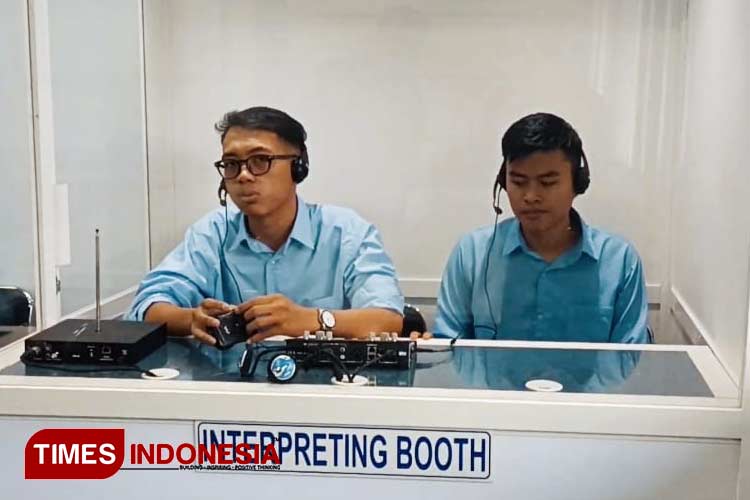Check This Interpreting Course Program of State Polytechnic of Malang

TIMESINDONESIA, MALANG – At the State Polytechnic of Malang, especially in the Department of Commercial Administration, English Study Program, one special class appears to study Interpreting Classes to meet the needs of effective communication between languages and cultures. Interpreting is an example that provides opportunities that are believed to hone spoken language skills.
The interpreting activity is different from translation which is done in writing, this activity is done in real time. The high demand for interpretation services in various fields such as international conferences, diplomatic negotiations, and health services has led many to take interpreting classes.
Advertisement
It is not surprising that many institutions in Indonesia have provided this course, one of which is at the State Polytechnic of Malang, the D4 English for Business and Professional Communication study program in the Department of Commercial Administration.
For approximately three semesters, students are entitled to follow at least three different types of interpreting courses. These include consecutive interpreting, simultaneous interpreting, and business interpreting.
As a diploma study program, students get more practical learning than theory. Below are the differences between the three types of interpreting available in this study program.
1. Consecutive Interpreting
This type is done alternately where the language source will convey information to the interpreter. Then, the interpreter will deliver the target language with brief notes during the conversation. Consecutive interpreting takes longer than simultaneous interpreting because the interpreter has to take notes before delivering the translation.
2. Simultaneous Interpreting
Unlike the previous type, this method is directly performed simultaneously by the source language speaker and the interpreter directly translates it. Simultaneous interpreting is the most difficult type of interpreting because the interpreter must understand the speaker's message in real-time and deliver it directly without any pauses.
3. Business Interpreting
Business interpreting is a flexible form that can use either consecutive interpreting or simultaneous interpreting depending on the situation. However, this type is more likely to use business language as the main theme of the interpreting activity.
Business interpreting can be implemented in various business situations, such as negotiations, international meetings, and product presentations.
To support this class, these courses are equipped with a wide range of facilities to enhance the learning experience. There is a special room prepared for interpreting called Interpreting Booth; or it can also be said as “Interpreting Room”. This room is specially designed for interpreting activities so that students can concentrate without any outside distractions.
Students will get tools to support the needs of this class such as microphones, headsets, stationery, notebooks, and others. These facilities are very helpful for students to be able to get an atmosphere like a professional worker.
Interpreting can be a great opportunity for young people. Such as interpreting classes that can support their learning needs in order to get basic and better experiences. Some institutions in Indonesia, especially in the field of linguistics, already have this course.
Through this program, it is expected that the State Polytechnic of Malang (Polinema) students can maximize their abilities in the field of linguistics and also participate in responding to the demands of industry in the era of globalization. (*)
**) Ikuti berita terbaru TIMES Indonesia di Google News klik link ini dan jangan lupa di follow.
| Editor | : Khodijah Siti |
| Publisher | : Ahmad Rizki Mubarok |

